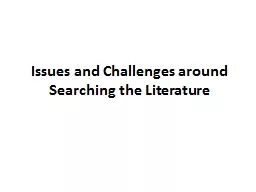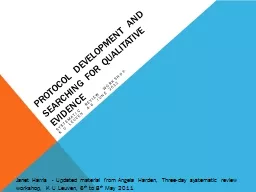PPT-Advanced search skills: Literature searching for projects & dissertations using biomedical
Author : badra | Published Date : 2024-01-29
Kate Brunskill neurolibraryuclacuk wwwuclacukionlibrary Menti login Learning objectives Explore advanced search methods including defining the topic selecting
Presentation Embed Code
Download Presentation
Download Presentation The PPT/PDF document "Advanced search skills: Literature searc..." is the property of its rightful owner. Permission is granted to download and print the materials on this website for personal, non-commercial use only, and to display it on your personal computer provided you do not modify the materials and that you retain all copyright notices contained in the materials. By downloading content from our website, you accept the terms of this agreement.
Advanced search skills: Literature searching for projects & dissertations using biomedical: Transcript
Download Rules Of Document
"Advanced search skills: Literature searching for projects & dissertations using biomedical"The content belongs to its owner. You may download and print it for personal use, without modification, and keep all copyright notices. By downloading, you agree to these terms.
Related Documents














